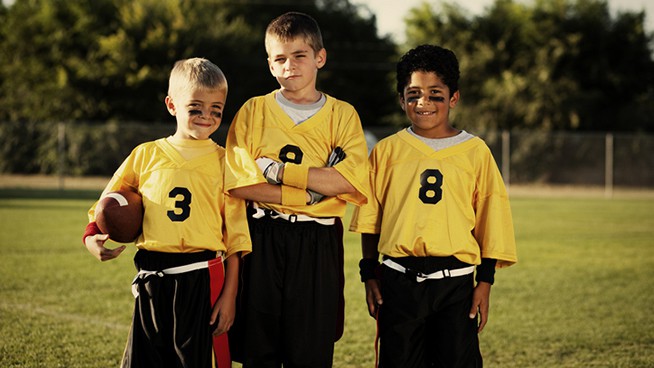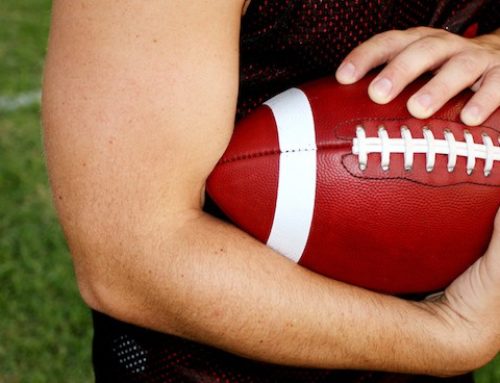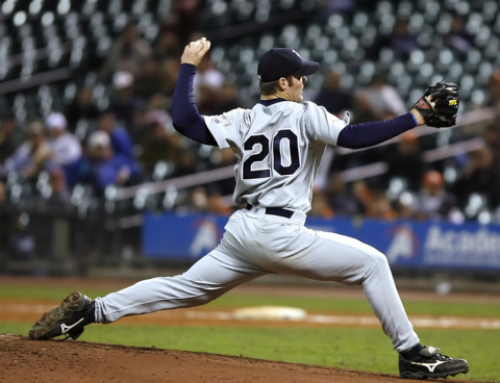Missouri DE Charles Harris Brings a ‘Black Mamba Mentality’ to The NFL
Charles Harris still remembers his first football play.
He was a junior at Lincoln College Prep. He’d spent his entire life dreaming of being an NBA star, and he was already well on his way to earning a college basketball scholarship. He only got into football after he’d been called out by members of the team who laughed at him and told him he was “too soft” to put on pads and a helmet. He didn’t like that. So here he was, a basketball player lining up at linebacker. He had no clue what he was doing, aside from the fact he needed to tackle whoever had the ball.
“I didn’t even know the play call. I was playing linebacker, and I saw a big ol’ hole open up. I thought, ‘that must be where the ball’s going.’ So I shot through the gap, I saw the quarterback hand the ball off to the running back, and I just smoked him,” Harris says. “That was my first play ever. Ever since then, I was like, ‘yeah, this is it right here.’”
A few short years later, Harris is now projected as a first-round pick in the 2017 NFL Draft. His path to the pros was far from ordinary, but it morphed him into a ferocious edge defender who compiled 16 sacks and 30.5 tackles for loss over his final two seasons at the University of Missouri.
Harris was raised on 31st street in Kansas City, Missouri, a neighborhood where crime and poverty are common. He didn’t see it as a particularly dangerous area while he was growing up, since it was all he knew. “I never went past Prospect Avenue, never went past Van Brunt Boulevard. I never had a fear of living where I lived. But according to other people, it’s a real terrible place. But when you’re born and raised in that environment, it’s just natural to you. When I got to middle school and high school, I started traveling to the suburbs more. That’s when I realized my environment might not be the best place to grow up, might not be the safest place or the best place for a child,” Harris said.
Shooting hoops became a sanctuary for him. The simplicity of the game was one reason why he fell in love, since all he needed to practice was a hoop, a ball and himself. “Basketball was different because I didn’t have anybody to play with me. I would go outside in the backyard and shoot around by myself, and it’s just a ball and a hoop. I think that’s why I fell in love with the game, it’s just so independent,” Harris said.
He idolized Kobe Bryant and the killer mentality he brought to the court. “I love Kobe Bryant. I remember the day after he scored 81 points against the Toronto Raptors, I went into my backyard and threw up 81 shots. I was trying to be just like him,” Harris said.
RELATED: 7 Pro Athletes Who Grew Up Wanting to Play a Different Sport
Harris quickly became one of the premier young basketball players in Kansas City. When he was in sixth grade, a neighbor began giving him boxing lessons. The sport was a more aggressive outlet for Harris, who was beginning to experience a lot of pent-up anger in his life.
“I was in sixth grade, and it was a time when I was really troubled. Having an outlet and having someone take me along with them and put my aggression towards something positive, I thank him for that,” Harris said. “I started falling in love with it. We’d go to the YMCA around the corner and box. There wasn’t much past that, but that experience and that exposure to a new sport really helped me.”
Harris continued to blossom on the basketball court, and by the time he reached Lincoln College Prep—a magnet school in the Kansas City public school district—he had become a tall, muscular athlete. Lee Allen, the school’s head football coach at the time, tried to convince Harris to give football a shot. But Harris believed running cross country in the fall helped him enter basketball season well-conditioned and healthy, so he turned down Allen’s repeated offers. It wasn’t until a chance encounter with the football team during his junior year that Harris finally relented.
“I was going with my friend to coach’s classroom, because she needed to drop off something,” he recalled. “The whole football team was in there. He asked me what I was doing there and I told him I was just there with my friend while she dropped something off. “He said, ‘OK, I thought you were here to play football.’ Then someone on the team yelled out that I was too scared.”
That declaration ignited something deep inside Harris. The next day, he showed up at football practice determined to prove he was more than tough enough to play. “I couldn’t let anybody think I was scared to play a sport or anything like that,” Harris said. “If I would’ve never walked into that room and felt that embarrassment, I don’t think I’d be playing football right now. I’m just glad and grateful that my mentality is different. I don’t like embarrassment, I don’t like defeat. I’m a competitive person. Any other individual thinking I’m weaker than them is going to draw out the best in me. I was going to show them I could do it just as well as they could.”
Though he had to log a few days without pads before he could dole out any contact, Harris remembers dusting his teammates during his first practice. He said, “I remember we had flying 110s, and I was just beating everybody. It was like I never got tired. Coach told me to go to this station, go to that station, run a hill, whatever—it was like alright, I got this. My body wouldn’t let me stop, I was running all day.”
RELATED: 4 Football Conditioning Drills That Work
Soon enough, Harris was doing more than running. His basketball and boxing background had helped him build the skillset a defender needs to knife through the offensive line—agility, quickness, body control, hand-eye coordination, hand-striking and a wicked spin move. “I had no type of knowledge, no type of experience with football before that season,” Harris said. But he notched 40 tackles and 6 sacks during his junior season while operating with almost no technique. He followed that up with a spectacular season on the hardwood, which earned him All-Interscholastic League Player of the Year honors.
When he came back for his senior season of football, Harris’s technique and feel for the game were much improved. That helped him record 60 tackles, 12 sacks and two forced fumbles en route to an All-Kansas City Metro third-team selection.
After another strong season of basketball, Harris was faced with a decision. Was he going to play basketball, his long-time love, or football, his new flame, in college?
The fact that he had zero recruiting buzz on the football front but an offer from Missouri Western for basketball made it seem like the decision had been made for him. That is until the University of Missouri asked him to come in for a visit the week of National Signing Day. They loved his tape and potential, and Harris passed the eyeball test. They offered and Harris happily accepted, but the enormity of the situation made him crank up his already-intense work ethic to insane levels.
“I finally had my way to get to college. Everyone around me was so elated, my city, my teachers, my peers, my family. They had reason to be happy, it was a big deal,” Harris said. “But in my mind, it was a one-year contract. It wasn’t guaranteed. I knew I had to work for it day in and day out. I saw it as I just got myself into this huge thing. I’m going to the SEC. I’m going to a big-time college. My grind, my physicality, my preparation, my mentality, it all had to go to a new level. That was my mentality. I never got comfortable. And through being uncomfortable, that’s what pushed my grind to a whole new level.”
When Harris arrived at Missouri, he found himself under the tutelage of two dynamic defensive linemen—Shane Ray and Markus Golden. Both have since become highly productive NFL players. Ray and Golden were the alpha dogs of the “D-Line Zou,” a nickname for Missouri’s perennially elite D-line unit.
“Markus and Shane, they were all about passion, tenacity, the non-stop, every play is your play mentality,” Harris said. “When I went to Mizzou, I was so low on the depth chart, those are the two guys I looked up to. Those two were the face of D-Line Zou. They taught me to be patient, to take everything in, to be humble and to wait my turn. And that’s exactly what I did.”
RELATED: Why Did Broncos Linebacker Shane Ray Get a Huge Kansas City Chiefs Tattoo?
Despite limited reps during his freshman season, Harris flashed big-play ability by notching 4 tackles for loss, 2 sacks and a forced fumble. His intense demeanor on the field was akin to the “Black Mamba mentality” that Kobe Bryant displayed during his NBA career. “It’s not something I do purposely,” Harris said. “But the eyes, the stare, the look, just always being focused. [How Kobe approached basketball], that’s how I approach football.”
Harris earned the nickname “Black Ice” from linebacker Eric Beisel, a reference to the invisible, often-fatal patches of ice that form on midwest roads during winter storms. Beisel explained to Harris the logic behind the moniker—by the time an opponent saw him coming, it was already too late.
Ray and Golden departed for the NFL following Harris’s freshman season, allowing him to take center stage as a sophomore. He burst onto the scene that year with 18.5 tackles for loss (most in the SEC) and 7 sacks. The season earned him second-team All-SEC honors and did wonders for his confidence. Since he was now eligible to declare for the draft, Harris did his due diligence by sending his name into the NFL for a preliminary evaluation. The league told him he would’ve been a possible second-round pick if he decided to come out for the 2016 NFL Draft.
Imagine that—you just finished your fourth season of football ever, and the NFL is already telling you that you could be a second-round draft pick. The contracts given to second-round picks last season ranged between from $3.9 and $6.6 million dollars. Life-changing money. But Harris felt he had unfinished business at Missouri. Not only did he have lingering shoulder injuries he wanted to address before he entered the NFL, but he wanted to solidify himself as more than a second-round pick.
“I knew my health was the most important thing, and I also wanted to come back for another year to really do better. I wanted to give the Mizzou fans another year, give my coaches and my teammates another year. I wasn’t just going to run off to the NFL because I saw a good grade. I wanted to solidify myself as a first-round pick,” Harris said.
RELATED: The Beast Inside Stanford’s Solomon Thomas is Coming for The NFL
Harris underwent shoulder surgery on both his right and left shoulders following his sophomore season. That sidelined him for nearly the entire spring, a fact that didn’t sit well with him. “I wasn’t able to Bench, wasn’t able to Squat, wasn’t able to run. So I’m like, everyone around me is getting better. People around the country are getting better. It was so hard to go through that, but it helped me learn I could go through anything. After that, I feel like nothing, no type of injury, no situation, can stop me from getting where I want to go,” Harris said.
When Harris was able to return to training, he attacked each workout with fury, knowing every rep took him closer to his dream of being a first-round pick. But a new defensive coordinator with a new scheme put Harris in less of an attacking and more of a read-and-react role for his junior season. It wasn’t an easy adjustment for him. He believes his biggest strength is his ability to get upfield and alter plays. But he still had a superb season, recording 61 tackles, 9 sacks, 12 tackles for loss and 2 forced fumbles, cementing his status as a likely first-round selection in the 2017 NFL Draft.
[youtube video=”05WmjSIQz3s”]Shortly after the conclusion of his junior season, Harris began training for the draft process (Combine, Pro Day, private workouts, etc.) at Proactive Sports Performance in Santa Ana, California. STACK was on-hand for a few of his workouts, and the dude was flat-out freak. We watched in awe as he rowed the entire stack on a cable machine with one arm:
Mizzou DE Charles Harris showing that grown man strength by single-arm cable rowing the entire stack #NFLDraft #MizzouFootball pic.twitter.com/Vh1xpTLsZt
— STACK (@STACKMedia) February 9, 2017
“Charles was our first guy to arrive in this year’s NFL Draft training class. He’s laser-focused, he has high expectations for himself. If he doesn’t reach the specific goals we lay out for him, it eats him up,” said Ryan Capretta, owner of Proactive. “He’s super explosive. He’s great in the weight room, but he’s able to transfer that power to the field really well.”
Harris, who measured 6-foot-3, 253 pounds at the NFL Combine, recently said he expects to be selected in the “top 15” picks of the Draft. But no matter where he goes, he swears he won’t be comfortable. Just like the bright lights of the SEC pushed him to take his work ethic to new heights, so is the idea of starring in the National Football League.
“I feel like [when I get drafted], it’ll be a similar feeling to how I felt when I committed to Mizzou. I’ll be happy, grateful, blessed, thankful to God,” Harris said. “But I’m not going to be comfortable. I’m not going to think I’ve made it. That mentality isn’t going to enter my mind. If anything, I’m going to be like, ‘ok, this is the National Football League. This is the top level. So guess what Charles? You’ve gotta become the top dog. You gotta take your grind to a whole new level.’ This isn’t a game no more. This is your job. This is how you wake up and feed your family. My mentality is not going to change. Mizzou took a chance on me, so I’m just waiting to see whoever’s going to take a chance on me this time.”
See More From Our Path to The Pros Series
RECOMMENDED FOR YOU
MOST POPULAR
Missouri DE Charles Harris Brings a ‘Black Mamba Mentality’ to The NFL
Charles Harris still remembers his first football play.
He was a junior at Lincoln College Prep. He’d spent his entire life dreaming of being an NBA star, and he was already well on his way to earning a college basketball scholarship. He only got into football after he’d been called out by members of the team who laughed at him and told him he was “too soft” to put on pads and a helmet. He didn’t like that. So here he was, a basketball player lining up at linebacker. He had no clue what he was doing, aside from the fact he needed to tackle whoever had the ball.
“I didn’t even know the play call. I was playing linebacker, and I saw a big ol’ hole open up. I thought, ‘that must be where the ball’s going.’ So I shot through the gap, I saw the quarterback hand the ball off to the running back, and I just smoked him,” Harris says. “That was my first play ever. Ever since then, I was like, ‘yeah, this is it right here.’”
A few short years later, Harris is now projected as a first-round pick in the 2017 NFL Draft. His path to the pros was far from ordinary, but it morphed him into a ferocious edge defender who compiled 16 sacks and 30.5 tackles for loss over his final two seasons at the University of Missouri.
Harris was raised on 31st street in Kansas City, Missouri, a neighborhood where crime and poverty are common. He didn’t see it as a particularly dangerous area while he was growing up, since it was all he knew. “I never went past Prospect Avenue, never went past Van Brunt Boulevard. I never had a fear of living where I lived. But according to other people, it’s a real terrible place. But when you’re born and raised in that environment, it’s just natural to you. When I got to middle school and high school, I started traveling to the suburbs more. That’s when I realized my environment might not be the best place to grow up, might not be the safest place or the best place for a child,” Harris said.
Shooting hoops became a sanctuary for him. The simplicity of the game was one reason why he fell in love, since all he needed to practice was a hoop, a ball and himself. “Basketball was different because I didn’t have anybody to play with me. I would go outside in the backyard and shoot around by myself, and it’s just a ball and a hoop. I think that’s why I fell in love with the game, it’s just so independent,” Harris said.
He idolized Kobe Bryant and the killer mentality he brought to the court. “I love Kobe Bryant. I remember the day after he scored 81 points against the Toronto Raptors, I went into my backyard and threw up 81 shots. I was trying to be just like him,” Harris said.
RELATED: 7 Pro Athletes Who Grew Up Wanting to Play a Different Sport
Harris quickly became one of the premier young basketball players in Kansas City. When he was in sixth grade, a neighbor began giving him boxing lessons. The sport was a more aggressive outlet for Harris, who was beginning to experience a lot of pent-up anger in his life.
“I was in sixth grade, and it was a time when I was really troubled. Having an outlet and having someone take me along with them and put my aggression towards something positive, I thank him for that,” Harris said. “I started falling in love with it. We’d go to the YMCA around the corner and box. There wasn’t much past that, but that experience and that exposure to a new sport really helped me.”
Harris continued to blossom on the basketball court, and by the time he reached Lincoln College Prep—a magnet school in the Kansas City public school district—he had become a tall, muscular athlete. Lee Allen, the school’s head football coach at the time, tried to convince Harris to give football a shot. But Harris believed running cross country in the fall helped him enter basketball season well-conditioned and healthy, so he turned down Allen’s repeated offers. It wasn’t until a chance encounter with the football team during his junior year that Harris finally relented.
“I was going with my friend to coach’s classroom, because she needed to drop off something,” he recalled. “The whole football team was in there. He asked me what I was doing there and I told him I was just there with my friend while she dropped something off. “He said, ‘OK, I thought you were here to play football.’ Then someone on the team yelled out that I was too scared.”
That declaration ignited something deep inside Harris. The next day, he showed up at football practice determined to prove he was more than tough enough to play. “I couldn’t let anybody think I was scared to play a sport or anything like that,” Harris said. “If I would’ve never walked into that room and felt that embarrassment, I don’t think I’d be playing football right now. I’m just glad and grateful that my mentality is different. I don’t like embarrassment, I don’t like defeat. I’m a competitive person. Any other individual thinking I’m weaker than them is going to draw out the best in me. I was going to show them I could do it just as well as they could.”
Though he had to log a few days without pads before he could dole out any contact, Harris remembers dusting his teammates during his first practice. He said, “I remember we had flying 110s, and I was just beating everybody. It was like I never got tired. Coach told me to go to this station, go to that station, run a hill, whatever—it was like alright, I got this. My body wouldn’t let me stop, I was running all day.”
RELATED: 4 Football Conditioning Drills That Work
Soon enough, Harris was doing more than running. His basketball and boxing background had helped him build the skillset a defender needs to knife through the offensive line—agility, quickness, body control, hand-eye coordination, hand-striking and a wicked spin move. “I had no type of knowledge, no type of experience with football before that season,” Harris said. But he notched 40 tackles and 6 sacks during his junior season while operating with almost no technique. He followed that up with a spectacular season on the hardwood, which earned him All-Interscholastic League Player of the Year honors.
When he came back for his senior season of football, Harris’s technique and feel for the game were much improved. That helped him record 60 tackles, 12 sacks and two forced fumbles en route to an All-Kansas City Metro third-team selection.
After another strong season of basketball, Harris was faced with a decision. Was he going to play basketball, his long-time love, or football, his new flame, in college?
The fact that he had zero recruiting buzz on the football front but an offer from Missouri Western for basketball made it seem like the decision had been made for him. That is until the University of Missouri asked him to come in for a visit the week of National Signing Day. They loved his tape and potential, and Harris passed the eyeball test. They offered and Harris happily accepted, but the enormity of the situation made him crank up his already-intense work ethic to insane levels.
“I finally had my way to get to college. Everyone around me was so elated, my city, my teachers, my peers, my family. They had reason to be happy, it was a big deal,” Harris said. “But in my mind, it was a one-year contract. It wasn’t guaranteed. I knew I had to work for it day in and day out. I saw it as I just got myself into this huge thing. I’m going to the SEC. I’m going to a big-time college. My grind, my physicality, my preparation, my mentality, it all had to go to a new level. That was my mentality. I never got comfortable. And through being uncomfortable, that’s what pushed my grind to a whole new level.”
When Harris arrived at Missouri, he found himself under the tutelage of two dynamic defensive linemen—Shane Ray and Markus Golden. Both have since become highly productive NFL players. Ray and Golden were the alpha dogs of the “D-Line Zou,” a nickname for Missouri’s perennially elite D-line unit.
“Markus and Shane, they were all about passion, tenacity, the non-stop, every play is your play mentality,” Harris said. “When I went to Mizzou, I was so low on the depth chart, those are the two guys I looked up to. Those two were the face of D-Line Zou. They taught me to be patient, to take everything in, to be humble and to wait my turn. And that’s exactly what I did.”
RELATED: Why Did Broncos Linebacker Shane Ray Get a Huge Kansas City Chiefs Tattoo?
Despite limited reps during his freshman season, Harris flashed big-play ability by notching 4 tackles for loss, 2 sacks and a forced fumble. His intense demeanor on the field was akin to the “Black Mamba mentality” that Kobe Bryant displayed during his NBA career. “It’s not something I do purposely,” Harris said. “But the eyes, the stare, the look, just always being focused. [How Kobe approached basketball], that’s how I approach football.”
Harris earned the nickname “Black Ice” from linebacker Eric Beisel, a reference to the invisible, often-fatal patches of ice that form on midwest roads during winter storms. Beisel explained to Harris the logic behind the moniker—by the time an opponent saw him coming, it was already too late.
Ray and Golden departed for the NFL following Harris’s freshman season, allowing him to take center stage as a sophomore. He burst onto the scene that year with 18.5 tackles for loss (most in the SEC) and 7 sacks. The season earned him second-team All-SEC honors and did wonders for his confidence. Since he was now eligible to declare for the draft, Harris did his due diligence by sending his name into the NFL for a preliminary evaluation. The league told him he would’ve been a possible second-round pick if he decided to come out for the 2016 NFL Draft.
Imagine that—you just finished your fourth season of football ever, and the NFL is already telling you that you could be a second-round draft pick. The contracts given to second-round picks last season ranged between from $3.9 and $6.6 million dollars. Life-changing money. But Harris felt he had unfinished business at Missouri. Not only did he have lingering shoulder injuries he wanted to address before he entered the NFL, but he wanted to solidify himself as more than a second-round pick.
“I knew my health was the most important thing, and I also wanted to come back for another year to really do better. I wanted to give the Mizzou fans another year, give my coaches and my teammates another year. I wasn’t just going to run off to the NFL because I saw a good grade. I wanted to solidify myself as a first-round pick,” Harris said.
RELATED: The Beast Inside Stanford’s Solomon Thomas is Coming for The NFL
Harris underwent shoulder surgery on both his right and left shoulders following his sophomore season. That sidelined him for nearly the entire spring, a fact that didn’t sit well with him. “I wasn’t able to Bench, wasn’t able to Squat, wasn’t able to run. So I’m like, everyone around me is getting better. People around the country are getting better. It was so hard to go through that, but it helped me learn I could go through anything. After that, I feel like nothing, no type of injury, no situation, can stop me from getting where I want to go,” Harris said.
When Harris was able to return to training, he attacked each workout with fury, knowing every rep took him closer to his dream of being a first-round pick. But a new defensive coordinator with a new scheme put Harris in less of an attacking and more of a read-and-react role for his junior season. It wasn’t an easy adjustment for him. He believes his biggest strength is his ability to get upfield and alter plays. But he still had a superb season, recording 61 tackles, 9 sacks, 12 tackles for loss and 2 forced fumbles, cementing his status as a likely first-round selection in the 2017 NFL Draft.
[youtube video=”05WmjSIQz3s”]Shortly after the conclusion of his junior season, Harris began training for the draft process (Combine, Pro Day, private workouts, etc.) at Proactive Sports Performance in Santa Ana, California. STACK was on-hand for a few of his workouts, and the dude was flat-out freak. We watched in awe as he rowed the entire stack on a cable machine with one arm:
Mizzou DE Charles Harris showing that grown man strength by single-arm cable rowing the entire stack #NFLDraft #MizzouFootball pic.twitter.com/Vh1xpTLsZt
— STACK (@STACKMedia) February 9, 2017
“Charles was our first guy to arrive in this year’s NFL Draft training class. He’s laser-focused, he has high expectations for himself. If he doesn’t reach the specific goals we lay out for him, it eats him up,” said Ryan Capretta, owner of Proactive. “He’s super explosive. He’s great in the weight room, but he’s able to transfer that power to the field really well.”
Harris, who measured 6-foot-3, 253 pounds at the NFL Combine, recently said he expects to be selected in the “top 15” picks of the Draft. But no matter where he goes, he swears he won’t be comfortable. Just like the bright lights of the SEC pushed him to take his work ethic to new heights, so is the idea of starring in the National Football League.
“I feel like [when I get drafted], it’ll be a similar feeling to how I felt when I committed to Mizzou. I’ll be happy, grateful, blessed, thankful to God,” Harris said. “But I’m not going to be comfortable. I’m not going to think I’ve made it. That mentality isn’t going to enter my mind. If anything, I’m going to be like, ‘ok, this is the National Football League. This is the top level. So guess what Charles? You’ve gotta become the top dog. You gotta take your grind to a whole new level.’ This isn’t a game no more. This is your job. This is how you wake up and feed your family. My mentality is not going to change. Mizzou took a chance on me, so I’m just waiting to see whoever’s going to take a chance on me this time.”


















